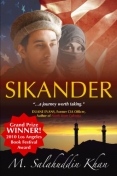BKMT READING GUIDES
Sikander
by M. Salahuddin Khan
Hardcover : 586 pages
1 club reading this now
0 members have read this book
It's 1986. Seventeen-year-old Sikander, dreams of studying and living in America, but in a blind rage after a family quarrel, he leaves his Peshawar, Pakistan home. Encountering mujahideen warriors, he joins them ...
Introduction
"SIKANDER is the sweeping tale of the son of a Pakistani middle-class family.
It's 1986. Seventeen-year-old Sikander, dreams of studying and living in America, but in a blind rage after a family quarrel, he leaves his Peshawar, Pakistan home. Encountering mujahideen warriors, he joins them in their fight against the occupying Soviets in neighboring Afghanistan. American assistance is stepped up with advanced weapons, like the Stinger missile, and the mujahideen begin prevailing against the Soviets. After just two years following Sikander s arrival, a Soviet withdrawal begins and Sikander returns as a war-wise hero, settling down to build a normal life in Pakistan. Discovering romance, Sikander, becomes a happily married successful entrepreneur in Pakistan, when he finds his life abruptly thrown into turmoil as he s caught up in aftermath of 9/11. He must draw on the lessons from his mujahideen past as he takes on a perilous journey reaching as far as America, changing his life forever. SIKANDER takes us from the pricey suburbs of Peshawar to the primitive war-torn landscape of Soviet-occupied Afghanistan, to the placid serenity of Scotland, through the camps of Guantanamo, and finally, corporate America. It is a 21 year journey through freedom and captivity, love and loss, wealth and poverty, dignity and humiliation, and transgression and redemption. A rare glimpse of a non-radical mainstream Muslim s experience of the West, SIKANDER is a journey of growth and self-discovery, and will touch the humanity of its readers.
Excerpt
PrefaceWhether we like it or not we live in a complex and dangerous world in which cultures often brush against each other. Diasporas (used generically here) and migrations fuel such effects and the assumptions grounded in one culture frequently fall apart when naïvely applied to another. I’m a product of a diaspora. I was born in Pakistan. I moved to England at the age of four, spending the next thirty-two years growing up and receiving an education there. In 1988 I moved to the United States. From my earliest years, I’ve found myself thrust into an outsider’s perspective of never quite belonging to the place where I’ve lived. ...
Discussion Questions
1. The novel, SIKANDER has been described as a “Bildungsroman.” Sikander is clearly an idealistic youth who becomes a realistic (but not cynical) adult. Far from being linear and gradual, his progression into this frame-of-mind takes place at discrete, defining moments in his life. Can you name some of these moments, and in particular how they shape his feelings about life and death?2. SIKANDER’s author uses a classical western style to convey the narrative yet avoids creating characters with which typically non-Muslim westerners can readily identify. How does this juxtaposition of non-Muslim style and Muslim point-of-view work for the reader?
3. Mahler is a decent human being for whom prejudices already sown by anxiety of the unknown, turn into loathing of Muslims after experiencing loss on 9/11. With such hatred and the available means to inflict punishment he falls victim to the temptation. Guilt never materializes because authority has sanctioned or perhaps even demanded such behavior.
Describe what you think this says about one’s own humanity as a moral compass; what the role of authority is in defining moral boundaries; the mechanisms by which prejudices seek and find comforting reinforcement, ultimately hardening into cherished truths; the importance of such truths to our perceptions of ourselves and of the world around us; the difficulty of dislodging prejudices even when the weight of evidence is compelling.
4. The leading female character, Rabia, undergoes her own transformation from Afghan village girl to upper-middle class wife of an entrepreneur in America. How does her transformation contrast with Sikander’s?
5. On a scale of 1=aloof observer to 5=immersed participant how do you feel as the reader?
6. Taking the portrayal of Islam in the narrative as accurate, which of your beliefs about Islam have been confirmed and which have been revised?
7. The practice of Islam is as varied as the cultures within which it is practiced. What differences were you able to pick up between Islam in Afghanistan and Islam in Pakistan, and between Islam in that region and your own sense of how it might be practiced in America?
8. How has the novel affected your perceptions of America’s role in the Afghanistan war and the outlook for the future? How would you define "success" in that war now?
Notes From the Author to the Bookclub
Note from author M. Salahuddin Khan: Sikander is about humanity transcending culture. It examines the way in which people in different cultures misunderstand each other, and then act on mistaken beliefs. It is also immerses a western, non-Muslim reader in a Muslim frame of reference from which they can experience life as a mainstream Muslim. I hope the reader leaves the book with new understanding as to how similar human beings are to each other the world over.Book Club Recommendations
Recommended to book clubs by 0 of 0 members.
Book Club HQ to over 90,000+ book clubs and ready to welcome yours.
Get free weekly updates on top club picks, book giveaways, author events and more








